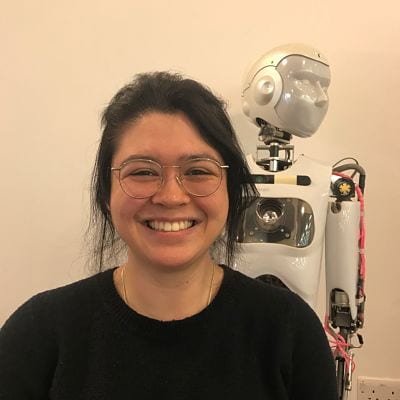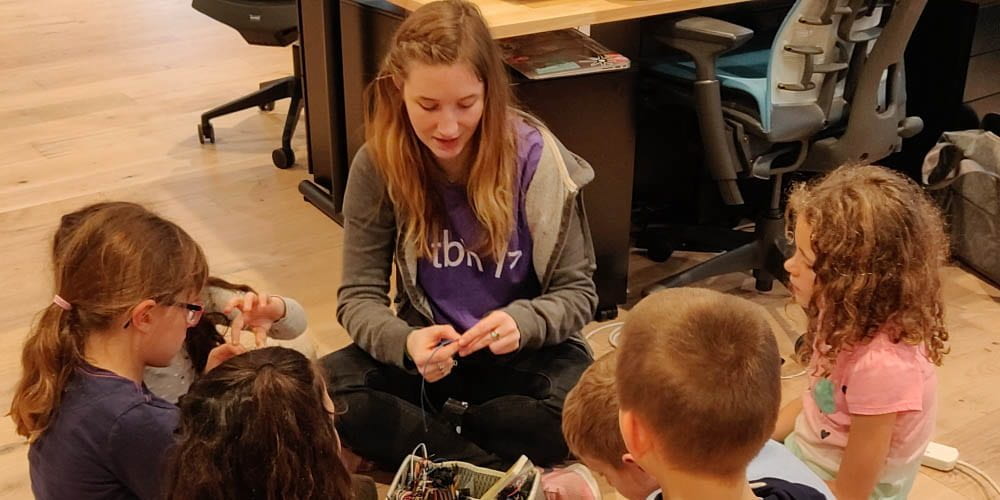Reaching out to the next generation
Even the youngest school kids can be creative with code. Our students want to get the message across: Whoever you are, whatever your background, you can be an engineer.
We spoke to PhD students Chanelle Lee and Laura Gemmell – Chanelle is a Teaching Associate and Laura is a Teaching Assistant in the Department of Engineering Mathematics. Both are keen to pass on their knowledge…
You’re both involved in Outreach. What does that involve and why is it important?

Chanelle: My biggest outreach project was as part of the British Council’s science in schools programme. We planned a workshop and ended up going to Nancy in France for a week. We introduced 10 to 12-year-olds to the concepts of biomimicry in robotics, looking at nature for inspiration on how to solve problems. It was an incredible experience. We used robots to bridge the language gap, a physical way of representing what we meant.
Outreach is important because a lot of young people can’t imagine themselves at university or being successful. I grew up in rural Dartmoor, I am mixed race, I had no role models or even the remotest idea that I could do what I’m doing now. In technology, it’s particularly important to try and strip away the stigma and show children that they are capable of programming and coding. It’s not this magical, mysterious thing that no one’s ever going to understand. Hopefully they’ll then go home, talk to their families about it and challenge the stereotypes.
Laura: I’ve always been really interested in explaining complex topics to different audiences. Although I volunteered with various companies’ kids clubs while doing my PhD, I noticed that the parents often worked in technology or had the resources to pay £150 a day for their children to attend. To me that just didn’t seem right. I felt it could lead to an even greater divide between people as they got older. So I set up a company called Taught by Humans, a social enterprise aiming to make the opportunities and benefits of technology accessible to everyone. I taught at a coding club in a school in Tottenham, showing how coding can be fun, I did lots of hands-on creative stuff, I ran work experience, aimed at teenage girls, to introduce them to the digital world. I really enjoyed that. You can make such a difference if you work in underprivileged areas. You can really see the impact you’re having.
What are you researching for your PhDs?
Chanelle: I’m just finishing my PhD on opinion pooling and consensus formation in group decision making. It’s related to swarm robotics, my main application, meaning groups of robots. The idea is that although individual robots have lower capabilities, by having lots of them, it doesn’t matter if some break, you still get the job done.
More information
Laura: I’m a Farscope PhD student looking at robotics and autonomous systems. I’m also in swarm robotics and my dissertation topic for my master’s was on neural networks for cancer treatment. I’m very interested in education, so for my PhD I’m focusing on how we can teach the public about robotics and artificial intelligence, particularly focusing on people who might be missed by other initiatives.
What were your favourite subjects at school and why?

Laura: I really hated school. I had a bad attendance rate and didn’t enjoy it at all. At GCSE I really loved IT, it was all based on Microsoft products, but it was my favourite subject. I started to enjoy school when I did mathematics A level and my teacher said ‘you know, you’re really good at this’. I really enjoyed my A level subjects, which were sociology, chemistry and mathematics.
Chanelle: I didn’t mind school, I quite enjoyed it. My favourite subject was always English literature. I absolutely loved it and that’s what I wanted to do. I was good at maths too, but often found it quite boring. My teacher sat me down and she said ‘I think it’s great that you love English literature, but have you thought about doing maths instead?’ That’s what I did and it was a good choice for me as I kept up the English literature at university through book clubs. Maths opened doors for me that I wouldn’t have even known about otherwise.
Laura: Yeah, it was the same for me. I was thinking of doing a sociology degree and my school said ‘you’re good at maths, you should do mathematics instead’. I’m really glad I did. But I’ve somehow come full circle as my research sits between engineering and sociology.
Where did you go to university and what brought you here?
Chanelle: I studied mathematics at Leeds but after I’d graduated, none of the obvious careers really appealed to me. Someone said I should think about doing a PhD. At the time, I was studying algebraic structures and very pure maths but I didn’t think I’d enjoy doing that for a PhD and devoting my life to it. Then I heard about Centres for Doctoral Training (CDTs) I browsed through the list of those and found the Farscope one for robotics at Bristol.
Laura: I stayed in Northern Ireland to study mathematics and statistics at Queen’s University in Belfast. I wanted to be an accountant when I started my degree and did a placement year with PWC working in the forensic technology department as a data analyst. I worked on the News International phone hacking scandal and really enjoyed it.
PWC offered me a job in London after my degree, but I didn’t like the long hours. I moved around for a bit, doing lots of different data analyst jobs, market research and advertising. I worked for World Pay, the card payment company, and got into coding through a social enterprise called Code First Girls. I was offered a job in the technology innovation team at World Pay, looking at new technologies e.g. blockchain, virtual reality, AI, all the buzzy words going around at the time.
When I needed a quote for a project from the Bristol Robotics Lab, I spotted the PhD on their website and applied on a whim. I was so convinced they wouldn’t accept me that I tried to cancel my interview by saying I couldn’t make it. But they said ‘OK, we’ll do it by Skype’. So I did the Skype interview and was offered a place. I was so shocked, I really didn’t think I would get in.
What are your top tips for those considering engineering as a degree?
Be inspired
Hidden Figures is the story of the women who
worked at NASA during the space race.
Laura is also a big fan of Margaret Hamilton,
NASA mathematician and champion for women.
Laura: Choose a subject you’re interested in because it will make your degree easier. Having said that, I did take mathematics, which opens a lot of doors for you. I don’t think you have to pick one subject over another. For example, I like technology and being a developer, but you can do that in a lot of industries. You can be a biologist, but still learn to code and build stuff. There’s also no harm in trying something and then changing your mind.
Chanelle: If you’re going to study for a degree, especially one like engineering, make sure you have that thirst for knowledge and the drive to enjoy your work. Because if you don’t have that and you’re forcing it, you’re going to struggle. You’ll need that passion. And if you don’t have it, then maybe the subject isn’t for you. There’s no harm in taking time out to figure out what it is you do really want to do. And don’t stress out too much in your first year.
What was your favourite pastime as a child?
Laura: I had a chess board that let you play against yourself. It’s quite sad. No one would play chess with me.
Chanelle: I used to read anything and everything. Just books and books and books. I even used to make a deal with my parents so I’d get a book instead of Easter eggs.


